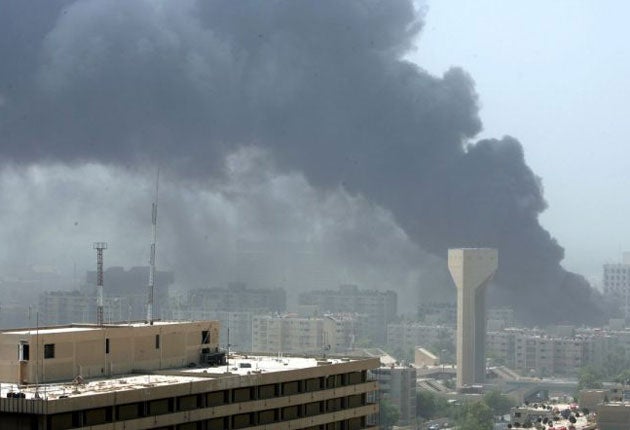Wave of deadly bombings hit Baghdad

Your support helps us to tell the story
As your White House correspondent, I ask the tough questions and seek the answers that matter.
Your support enables me to be in the room, pressing for transparency and accountability. Without your contributions, we wouldn't have the resources to challenge those in power.
Your donation makes it possible for us to keep doing this important work, keeping you informed every step of the way to the November election

Andrew Feinberg
White House Correspondent
Up to 100 people were feared dead in a wave of co-ordinated explosions across Baghdad today.
A massive truck bomb outside Iraq's Foreign Ministry near the secure Green Zone, knocked out concrete slabs and windows and left a mass of charred cars outside.
It was the deadliest attack in Iraq so far this year and marked a major challenge to the control of Baghdad.
A steady escalation of violence following the June 30 withdrawal of American troops from urban areas has heightened fears that government troops are not ready to provide security.
Iraqi officials blamed al-Qa'ida and other Sunni insurgents, echoing military warnings that the militant group is trying to provoke new bloodshed to undermine public trust in the Shiite-led Iraqi government.
"The terrorists are trying to rekindle the cycle of violence of previous years by creating an atmosphere of tension among the Iraqi people," Iraqi President Jalal Talabani said in a statement. "Our security forces must be more alert and firm. Also, the political groups must unite."
Sunni and Shia extremists remain active in Iraq, but truck bombs and suicide attacks bear the hallmarks of al Qaida.
The devastating strike outside the Foreign Ministry killed at least 60 people and wounded 250, but the final toll is expected to be much higher.
The truck was parked in a largely unguarded car park across the street but the force of the blast tore through the 10-storey building, which itself is surrounded by a concrete blast wall, as well as nearby apartment blocks.
A recent rise in bombings has dealt a blow to Iraqi government efforts to restore a sense of normalcy in the capital.
Iraqi security forces have begun removing concrete blast walls, which have been credited with helping reducing violence. The walls have been coming down in residential and commercial areas with the aim of improving appearance and easing traffic congestion.
The Finance Ministry was the first of the midmorning attacks. Minutes later mortars struck inside the Green Zone. It was not known what damage the mortars caused or whether there were causalities.
Another car bomb targeted a joint Iraqi police and army patrol just outside the Finance Ministry, killing at least 19 people and wounding 22.
Another blast in the commercial area of western Baghdad's Baiyaa district killed two people and wounded 16, while a bombing in the commercial district of Bab al-Muadham killed six people and wounded 24, authorities said.
General Ray Odierno, the top US commander in Iraq, said this week that he wanted to deploy soldiers alongside Iraqi and Kurdish troops in northern Iraq where some of the worst attacks in recent weeks have been carried out.
US troops withdrew from Iraq's cities on 30 June under a security pact that outlines the American withdrawal by the end of 2011.
President Barack Obama has ordered all US combat troops out of Iraq by 31 August next year, leaving a contingency of up to 50,000 in training and advising roles.
Subscribe to Independent Premium to bookmark this article
Want to bookmark your favourite articles and stories to read or reference later? Start your Independent Premium subscription today.
Join our commenting forum
Join thought-provoking conversations, follow other Independent readers and see their replies
Comments